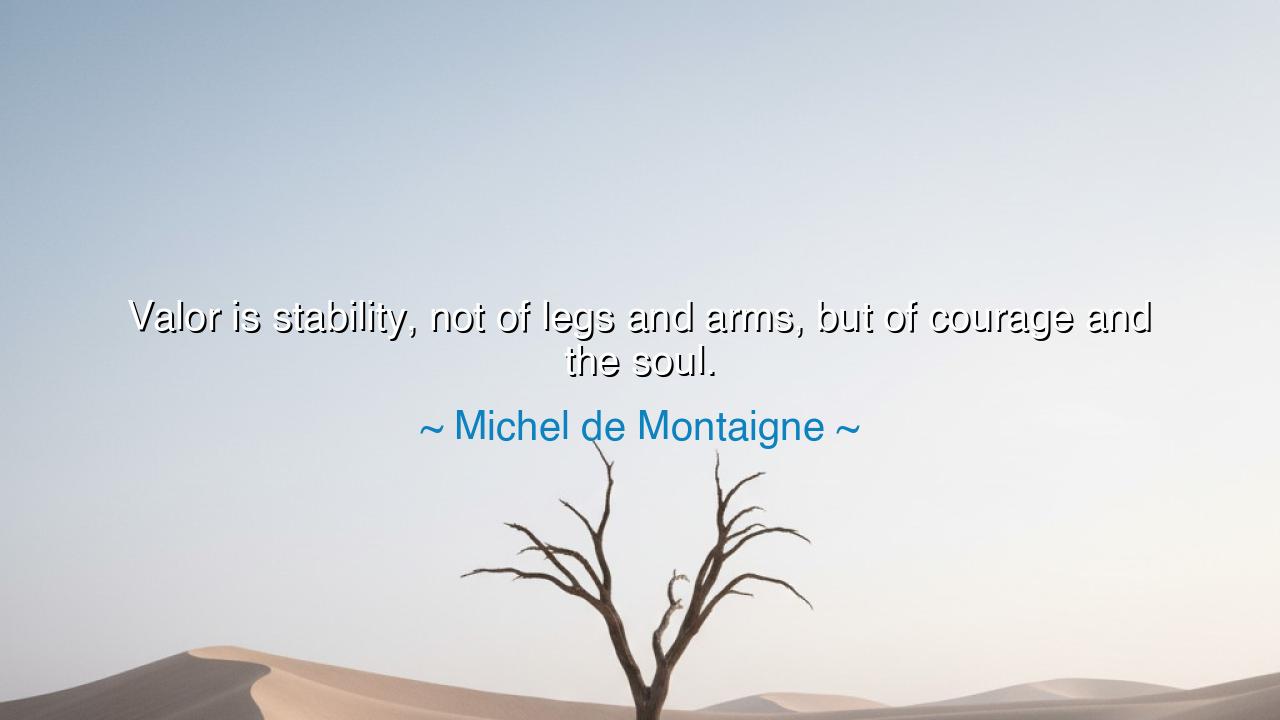
Valor is stability, not of legs and arms, but of courage and the






"Valor is stability, not of legs and arms, but of courage and the soul." Thus wrote Michel de Montaigne, the great philosopher of the Renaissance, whose words carried the wisdom of both the warrior and the sage. In this profound saying, he unveils the true nature of valor, stripping it of its outer trappings of battle and brawn, and revealing its essence as a strength born not from the body, but from the soul. To Montaigne, the brave are not those who stand firm by muscle alone, but those whose hearts remain steady when the storm of fear and doubt assails them. Courage, he tells us, is the stillness within—the calm center that endures when all else trembles.
In Montaigne’s time, the world celebrated the warrior’s glory—the flash of the sword, the power of the arm, the speed of the horse. Yet, as he reflected upon life and the frailty of man, he saw that valor was not measured by physical might, but by stability of spirit. For the body may tire and the limbs may fail, but the soul, when rooted in truth and courage, remains unshaken. He observed that even the strongest soldier can flee when fear enters the heart, while the frailest of men may stand immovable in the face of death if his conviction is pure. Thus, the true battlefield is within, and victory belongs to the one who has mastered himself.
This teaching calls to mind the ancient Stoics, whose philosophy Montaigne admired. They too believed that strength is born of inner composure, not outer might. Seneca wrote that the wise man is untroubled by fortune, unshaken by loss, and serene in the face of suffering, for his courage comes from within. And Marcus Aurelius, emperor and philosopher, taught that the soul becomes invincible when it accepts the world as it is, and acts rightly without fear. In these teachings, we find the same truth Montaigne expressed—that valor is the stability of the soul, a harmony between conviction and calm, even in chaos.
History is filled with those who embodied this invisible strength. Consider Mahatma Gandhi, who faced an empire not with swords, but with steadfast courage. Though his body was frail, his spirit was immovable. He endured imprisonment, insult, and violence, yet never wavered from his belief in truth and nonviolence. His valor was not in fighting, but in standing firm—not of legs and arms, but of courage and soul. So too was the strength of Socrates, who drank the cup of hemlock with serenity, unmoved by the fear of death, because his conscience was clear and his spirit stable. Such men prove that true valor is not the roar of battle, but the quiet endurance of the just.
In every age, the world mistakes fury for strength and noise for power. But Montaigne’s wisdom endures: valor is not loud—it is steadfast. It is the calm of the sailor who holds the rudder firm while waves rise high. It is the heart of the mother who endures hardship for her child. It is the faith of the one who stands for truth when the world mocks or condemns. It is the still flame that does not flicker, even when the wind howls. For when all external supports are stripped away, the soul alone must hold its ground—and that is where true courage lives.
The origin of Montaigne’s thought came from his lifelong contemplation of human nature. He had seen war, political turmoil, and loss. Yet he discovered that greatness is not found in conquest, but in composure—in the ability to remain true to one’s principles even amid uncertainty. He believed that the mark of a noble spirit is not victory, but constancy—a virtue that anchors a man in truth while the world sways like a storm-tossed sea. His words call us to remember that the mightiest fortresses are built not of stone, but of conviction and peace within.
So, my children of tomorrow, take this lesson to heart. When life’s trials rise before you, when fear shakes your knees and uncertainty clouds your path, remember that valor is not the absence of fear, but the mastery of it. Stand firm in your soul. Hold to your principles, even when they cost you. Cultivate courage, patience, and clarity—for these are the armor of the spirit. Do not seek to appear strong; seek instead to be steadfast. Let your stability be the kind that comes from faith, wisdom, and love for what is right.
For in the end, as Michel de Montaigne teaches, the greatest hero is not the one who conquers others, but the one who conquers himself. Bodies will falter, fame will fade, but the soul that stands firm in courage and virtue will outlast time itself. This is the strength that no blade can cut and no storm can move—the eternal valor of the spirit that endures, calm and unbroken, in the face of all the tempests of life.






AAdministratorAdministrator
Welcome, honored guests. Please leave a comment, we will respond soon